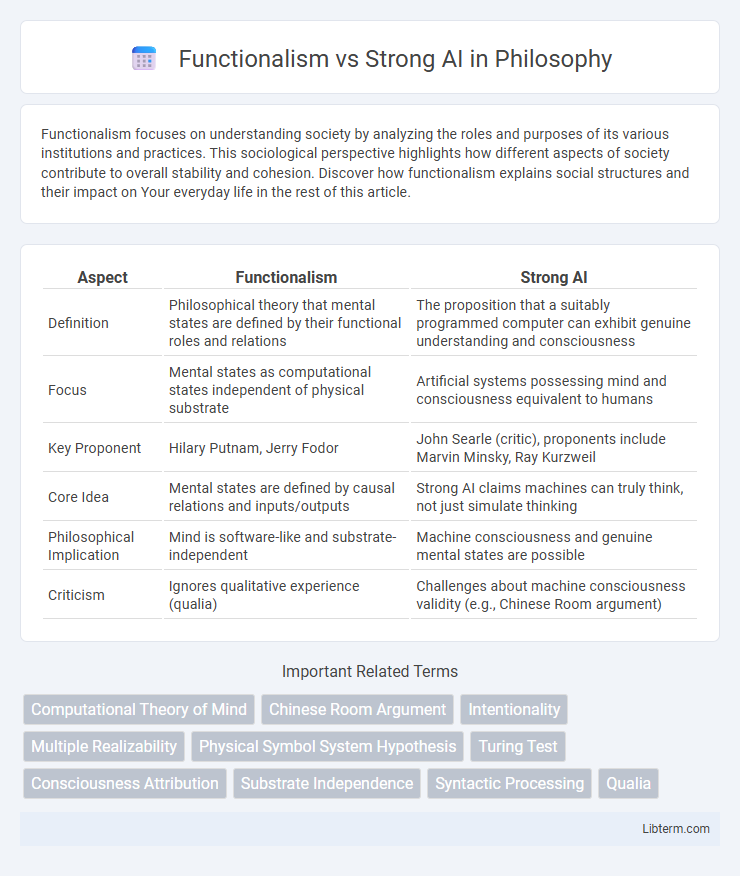Functionalism focuses on understanding society by analyzing the roles and purposes of its various institutions and practices. This sociological perspective highlights how different aspects of society contribute to overall stability and cohesion. Discover how functionalism explains social structures and their impact on Your everyday life in the rest of this article.
Table of Comparison
| Aspect | Functionalism | Strong AI |
|---|---|---|
| Definition | Philosophical theory that mental states are defined by their functional roles and relations | The proposition that a suitably programmed computer can exhibit genuine understanding and consciousness |
| Focus | Mental states as computational states independent of physical substrate | Artificial systems possessing mind and consciousness equivalent to humans |
| Key Proponent | Hilary Putnam, Jerry Fodor | John Searle (critic), proponents include Marvin Minsky, Ray Kurzweil |
| Core Idea | Mental states are defined by causal relations and inputs/outputs | Strong AI claims machines can truly think, not just simulate thinking |
| Philosophical Implication | Mind is software-like and substrate-independent | Machine consciousness and genuine mental states are possible |
| Criticism | Ignores qualitative experience (qualia) | Challenges about machine consciousness validity (e.g., Chinese Room argument) |
Understanding Functionalism and Strong AI
Functionalism is a theory in the philosophy of mind that defines mental states by their functional roles and causal relations rather than by their physical composition. Strong AI posits that a machine running the right program can possess genuine understanding, consciousness, and mental states equivalent to human minds. Understanding functionalism helps clarify how cognitive processes can be abstracted from biological substrates, providing a foundation for arguments supporting Strong AI's potential to replicate or simulate human-like cognition.
Core Principles of Functionalism in Mind Theory
Functionalism in mind theory emphasizes mental states as defined by their causal roles and functional relationships rather than by their physical composition. It posits that mental states are multiply realizable across different substrates, making the mind akin to software running on varied hardware. Strong AI advocates that a properly programmed computer can possess genuine understanding and consciousness, embodying mental states through functional organization.
Defining Strong AI and Its Aspirations
Strong AI refers to artificial intelligence systems designed to possess genuine understanding, consciousness, and cognitive abilities equivalent to human minds, aiming to replicate or exceed human mental processes. Unlike Functionalism, which emphasizes mental states as functional roles regardless of physical substrate, Strong AI aspires to create machines with real mental states and self-awareness. This ambition entails developing sophisticated algorithms and architectures that enable machines to think, learn, and experience in ways indistinguishable from humans.
Comparing Functionalism and Strong AI: Key Differences
Functionalism defines mental states by their causal roles and interactions within a system, emphasizing functional organization without requiring biological substrates. Strong AI asserts that appropriately programmed computers not only simulate but also genuinely possess minds and consciousness, equating cognitive processes with computational operations. The key difference lies in functionalism's theoretical framework for understanding mind, while Strong AI claims actual machine minds can exist through software implementation.
Functionalism’s View on Artificial Intelligence
Functionalism views artificial intelligence as a system defined by its functional processes rather than its physical substrate, emphasizing that mental states are identified by their causal roles in cognitive functions. According to Functionalism, AI can possess genuine intelligence if it replicates the functional organization of human minds, regardless of whether it is implemented in silicon or biological neurons. This perspective challenges the idea that consciousness or mind is tied exclusively to biological brains, promoting the development of AI based on functional equivalence.
The Role of Consciousness in Both Approaches
Functionalism views consciousness as an emergent property of functional organization in cognitive systems, emphasizing the causal roles of mental states rather than their physical substrate. Strong AI posits that an appropriately programmed computer can possess genuine consciousness, asserting that syntactic processing alone can give rise to subjective experience. Divergence lies in Functionalism's abstraction of mental states versus Strong AI's claim that consciousness can be fully realized through computational processes.
Criticisms of Functionalism and Strong AI
Criticisms of Functionalism highlight its inability to account for the qualitative, subjective experience known as qualia, arguing that computational processes cannot fully replicate human consciousness. Strong AI faces skepticism for assuming that simulating cognitive functions equates to genuine understanding or sentience, with critics emphasizing the Chinese Room argument and the lack of intentionality. Both perspectives struggle with bridging the explanatory gap between physical computational structures and the richness of human mental states.
Philosophical Implications in Cognitive Science
Functionalism in cognitive science posits that mental states are defined by their functional roles rather than by their physical substrate, emphasizing the abstract organization of mental processes. Strong AI claims that appropriately programmed machines can possess genuine understanding and consciousness, challenging traditional notions of mind and personhood. The philosophical implications center on debates about the nature of consciousness, the possibility of machine minds, and the criteria for genuine mental states in artificial systems.
Real-World Applications and Limitations
Functionalism underpins cognitive science models that simulate mental states through computational processes, enabling applications in natural language processing and robotic control, yet it struggles with subjective experience replication. Strong AI aims for genuine consciousness and understanding, presenting potential in autonomous decision-making systems but faces significant philosophical and technical limitations, particularly in achieving true sentience and intentionality. Real-world implementations reveal functionalism's practicality in task-oriented AI, whereas Strong AI remains largely theoretical with limited operational success.
Future Directions: Bridging Functionalism and Strong AI
Future directions in cognitive science and artificial intelligence emphasize integrating Functionalism's emphasis on mental states as functional roles with Strong AI's goal of replicating human-like consciousness and cognition. Developing hybrid models that combine functional architectures with advanced machine learning algorithms could enhance artificial systems' adaptability and understanding. Exploring neuro-symbolic approaches may bridge the gap between symbolic reasoning and functionalist processes, advancing more sophisticated and human-resembling AI systems.
Functionalism Infographic

 libterm.com
libterm.com